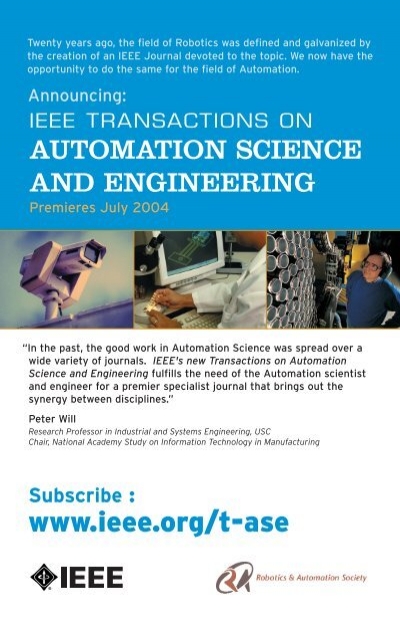Distributed Estimation and Motion Control in Multi-Agent Systems Under Multiple Attacks
IF 6.4
2区 计算机科学
Q1 AUTOMATION & CONTROL SYSTEMS
IEEE Transactions on Automation Science and Engineering
Pub Date : 2025-02-25
DOI:10.1109/TASE.2025.3545462
引用次数: 0
Abstract
This paper addresses the problem of distributed estimation and motion control (DEMC) in multi-agent systems (MASs) with both linear and Lipschitz nonlinear dynamics. Unlike conventional DEMC methods designed for MASs under ideal conditions, this work investigates scenarios where all agents are vulnerable to various forms of attacks. The considered attacks comprise false-data injection (FDI) attacks and denial of service (DoS) attacks that affect the communication channels among agents to destabilize the MAS. Also, the unbounded actuator attacks which exist in practical environments to intentionally degrade the MAS performance is considered. To cope with these kinds of attacks, two novel resilient approaches are established aimed at estimating and following a mobile target under attacks. The proposed distributed attack-resilient control strategies are designed based on a dual-layer structure, guaranteeing effective DEMC with an ultimately bounded error. The results from two simulation examples are provided to validate the presented algorithms. Note to Practitioners—The motivation of this work is to deal with the DEMC problem for MASs under multiple attacks. In most of the existing DEMC schemes for MASs, having a healthy network and dynamics is a requirement. However, in practical environments, MASs as an important subclass of cyber-physical systems are subject to different types of attacks that affect the network and dynamics of MASs and may seriously jeopardize the performance of the DEMC algorithm, or even worse, lead to instability. Therefore, a resilient hierarchical DEMC algorithm is proposed for MASs which allows agents to estimate and follow a mobile target under multiple attacks. The proposed scheme is resilient to most existing cyber-attacks and is designed for MASs with both linear and nonlinear dynamics. It can be applied to various practical engineering systems such as autonomous vehicles, mobile robots, and intelligent transportation systems. The stability and convergence of the proposed algorithms are analyzed mathematically, and it is shown that the agents not only track the estimated target but also can cope with multiple attacks through simulation experiments.多重攻击下多代理系统中的分布式估计和运动控制
本文研究了具有线性和Lipschitz非线性动力学的多智能体系统(MASs)的分布式估计和运动控制问题。与传统的在理想条件下为MASs设计的DEMC方法不同,这项工作研究了所有代理都容易受到各种形式攻击的情况。考虑的攻击包括假数据注入(FDI)攻击和拒绝服务(DoS)攻击,它们影响代理之间的通信通道,从而破坏MAS的稳定。此外,还考虑了实际环境中存在的无界致动器攻击,故意降低MAS的性能。为了应对这类攻击,建立了两种新的弹性方法,旨在估计和跟踪攻击下的移动目标。所提出的分布式攻击弹性控制策略是基于双层结构设计的,保证了有效的DEMC和最终有界的误差。通过两个仿真实例验证了所提算法的有效性。从业人员注意事项——这项工作的动机是处理多重攻击下MASs的DEMC问题。在现有的大多数面向MASs的dem方案中,具有健康的网络和动态是一个要求。然而,在实际环境中,MASs作为网络物理系统的一个重要子类,会受到不同类型的攻击,这些攻击会影响MASs的网络和动态,并可能严重危及DEMC算法的性能,甚至导致不稳定。为此,本文提出了一种针对MASs的弹性分层DEMC算法,该算法允许agent在多重攻击下对移动目标进行估计和跟踪。所提出的方案对大多数现有的网络攻击具有弹性,并且针对具有线性和非线性动力学的MASs设计。它可以应用于自动驾驶汽车、移动机器人、智能交通系统等各种实际工程系统。数学分析了算法的稳定性和收敛性,仿真实验表明,智能体不仅能够跟踪估计目标,而且能够应对多种攻击。
本文章由计算机程序翻译,如有差异,请以英文原文为准。
求助全文
约1分钟内获得全文
求助全文
来源期刊

IEEE Transactions on Automation Science and Engineering
工程技术-自动化与控制系统
CiteScore
12.50
自引率
14.30%
发文量
404
审稿时长
3.0 months
期刊介绍:
The IEEE Transactions on Automation Science and Engineering (T-ASE) publishes fundamental papers on Automation, emphasizing scientific results that advance efficiency, quality, productivity, and reliability. T-ASE encourages interdisciplinary approaches from computer science, control systems, electrical engineering, mathematics, mechanical engineering, operations research, and other fields. T-ASE welcomes results relevant to industries such as agriculture, biotechnology, healthcare, home automation, maintenance, manufacturing, pharmaceuticals, retail, security, service, supply chains, and transportation. T-ASE addresses a research community willing to integrate knowledge across disciplines and industries. For this purpose, each paper includes a Note to Practitioners that summarizes how its results can be applied or how they might be extended to apply in practice.
 求助内容:
求助内容: 应助结果提醒方式:
应助结果提醒方式:


